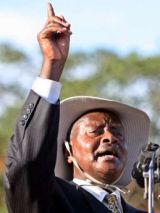Ugandan poll results show big lead for Museveni
Feb 24, 2006 (KAMPALA) — Ugandan President Yoweri Museveni took a near insurmountable lead over his main challenger Kizza Besigye in landmark polls, official tallies showed as the opposition threatened to reject the results.
 While his ruling party claimed outright victory in Uganda’s first multi-party polls since 1980, partial returns gave Museveni 63 percent of Thursday’s vote to Besigye’s 34 percent with nearly 60 percent of polling stations reporting.
While his ruling party claimed outright victory in Uganda’s first multi-party polls since 1980, partial returns gave Museveni 63 percent of Thursday’s vote to Besigye’s 34 percent with nearly 60 percent of polling stations reporting.
The latest figures made it all but mathematically impossible for Besigye to win but left open a slim chance of a run-off if Museveni’s totals fall to below 50 percent when all results come in.
But Museveni’s National Resistance Movement (NRM) said an internal canvas of polling stations in 63 of 69 districts showed its candidate winning with the same percentage announced by Uganda’s Electoral Commission.
“We have won this election,” NRM spokesman Ofwono Opondo told AFP. “We have won both the presidential and parliamentary vote.”
The official numbers showed the president well on his way to a third elected term in office, extending his 20-year hold on power with a new five-year mandate.
Besigye’s Forum for Democratic Change (FDC) alleged “serious irregularities” on polling day and in vote reporting and accused authorities of issuing returns slowly to “cook results in favor of President Museveni.”
“We will question the final results if we see irregularities in the way they have been announced,” FDC chairman Sulaimani Kiggundu told reporters. “We will reject them.”
Electoral Commission chairman Badru Kiggundu denied any malfeasance, saying any such charge was “non-factual” as he announced the latest returns.
With 58 percent of the nearly 20,000 polling stations reporting, the Electoral Commission said Museveni took 2,561,591, or 63 percent, to Besigye’s 1,380,304, or 33.98 percent.
Final returns are due Saturday.
A candidate needs more than 50 percent of the vote to avoid a run-off with the next highest finisher. The FDC insists Besigye had at least enough support to force Museveni into a second round.
Officials estimate that at least 60 percent of Uganda’s 10.4 million eligible voters turned out on election day, the relatively peaceful conduct of which was commended by European Union monitors on Friday.
But the EU Election Observation Mission also said the polls had been fraught with flaws and warned of post-election violence, citing deep voter fears that clashes would erupt as the counting continues.
“The electoral process experienced a number of problems, particularly during the campaign period,” it said in a statement, noting in particular that the vote was not held on “a level playing field.”
It said there had been “significant bias” against Besigye and other FDC candidates in the state-run media and that Museveni’s ruling National Resistance Movement used government resources to boost its support.
Kiggundu of the FDC listed examples of numerous alleged violations of election law, including reports of children voting multiple times in western and central Uganda and incidents of voter intimidation and disenfranchisement.
A local democracy watchdog said it feared up to 200,000 registered voters may have been unable to vote.
Meanwhile, Ugandan police briefly detained a top Museveni aide for questioning over an election day incident in which he fired a gun and apparently harassed, intimidated and detained voters.
Voters were choosing from the five presidential candidates and contenders for the 310-member parliament but the campaign, which was punctuated by sporadic violence was overshadowed by the Museveni-Besigye duel.
Although Museveni, who came to power in a 1986 coup, was widely expected to win, the spirited challenge from Besigye, his former personal physician and friend, had riveted this country of 26 million.
The race had been filled with intrigue, spite and criminal allegations, but centered on whether Ugandans wanted a change in leadership amid growing questions about Museveni’s commitment to democracy.
(ST/AFP)
